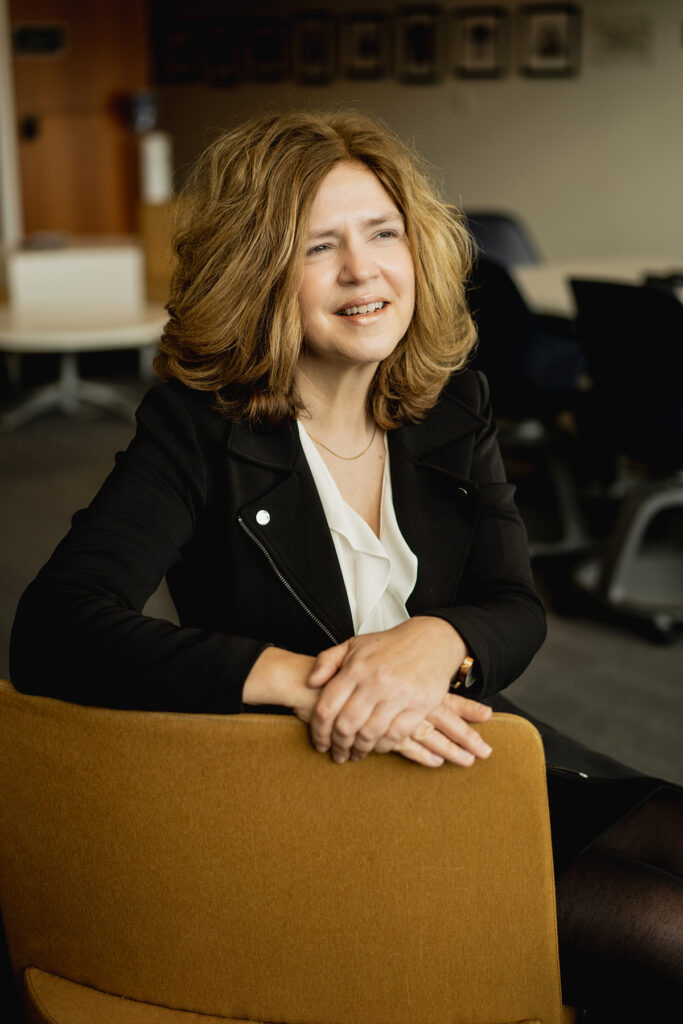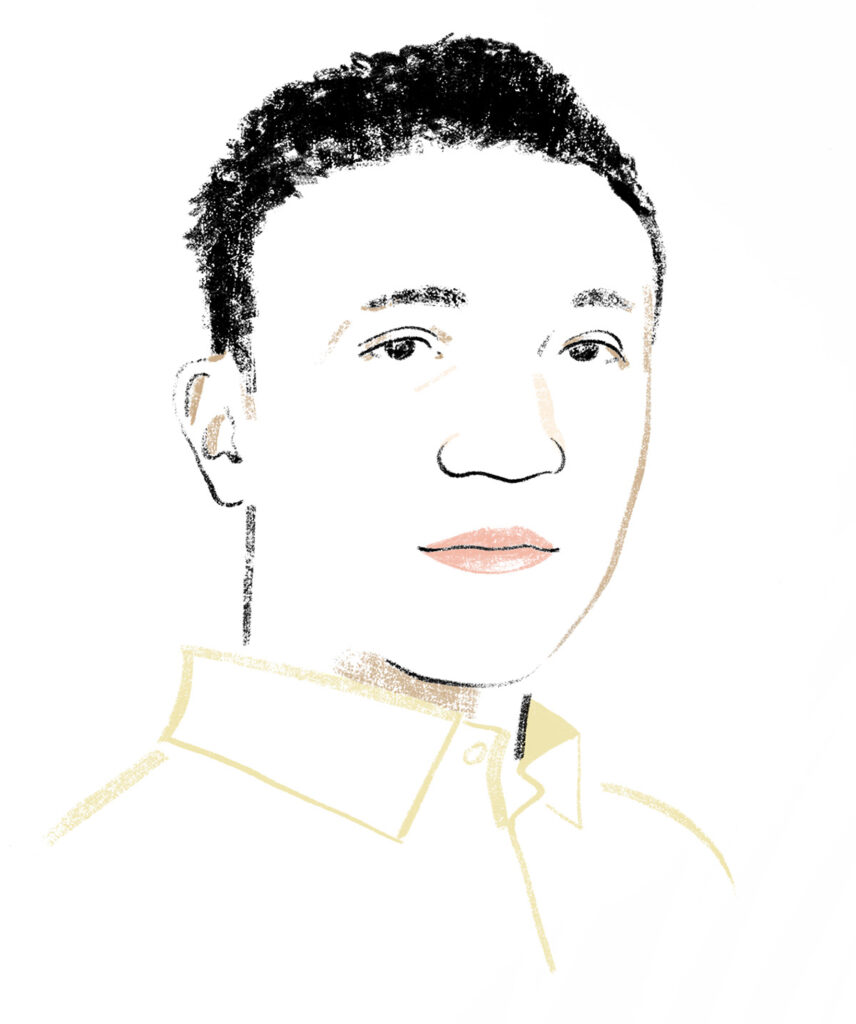Getting Down to Business
Maureen Kieff, MBA’89 (Metro), senior lecturer of quantitative analysis, has taught courses in decision sciences at FDU since 2003. She is a past recipient of FDU’s Distinguished Faculty Award for Teaching. She is chair of the Student Development Committee, focused on professional development and scholarship. She has served as a mentor and as a reader of multiple honors theses.
Qiwei Li, BS’13 (Metro), works in risk control on corporate loans and client service advisory at United Overseas Bank, which is based in Singapore. He came to FDU from China as an international student and quickly immersed himself in American culture. He returned to China and has been employed for eight years at the bank’s office in Hangzhou, Zhejiang, a 45-minute train ride away from Shanghai.

Maureen Kieff (Photo: Bill Cardoni)
Kieff and Li first met in the classroom — she remembers a reserved young man, who bonded quickly with friends and classmates, and delighted in traveling the United States on break. “What I found most intriguing about Qiwei is that he was a great photographer,” says Kieff. “I looked forward to seeing his trips through the lens of his camera.”
Li calls his first calculus class with Kieff the “most enjoyable” class of the semester. “Moreover,” he says, “Professor Kieff was always available and tried to do her best to help us grow.”
These days, the two reconnect through email and with in-person lunch meetings when Li travels to the U.S. “We talk about jobs, campus and life,” Li says. “She always gives me professional guidance and inspiration in every conversation, both of which I’ve benefitted from a lot.”
Qiwei Li: How did you figure out what you wanted to do with your life, in terms of your career?
Maureen Kieff: A faculty member pointed out my strengths and strongly encouraged me to change my major to mathematics and pursue a career path using, in his words, “my strong analytical skills.” I had no idea what I would do with that degree; however, I really enjoyed my coursework, and I graduated with a degree in mathematics. My mother was an educator, and as I neared completion of my bachelor’s degree, I seriously considered teaching high school.

Qiwei Li (Illustration: Arthur Mount)
Q.L.: How did you get to where you are today?
M.K.: I wanted to go to graduate school, and I wanted to teach. However, this did not go as I initially planned, and I ended up working on my M.B.A. As part of my graduate assistantship, I had the opportunity to tutor students. I discovered that I had a talent and flair for teaching. With the aid of an outstanding mentor, Richard Panicucci, [BS’64, MBA’66 (Metro), the late professor emeritus of quantitative analysis and retired assistant provost for campus life (see In Memoriam, page 63)], who encouraged me to pursue a career in teaching, I obtained a position as an adjunct professor.
Q.L.: What is the most helpful piece of advice you have received?
M.K.: To recognize and appreciate my talents and gifts. As an undergraduate student, it was very difficult for me to view or perceive my future path.
Q.L.: How can I stay connected to key influencers who do not work in the same office or even geographical area as I do?
M.K.: I believe the best way to connect is through LinkedIn. However, emailing people can be an effective tool as well. If you email them make sure to research (do your homework!) the individual you wish to communicate with (one who best fits your current job profile and your aspirational career) and clearly articulate questions.
Q.L.: What does mentorship mean to you?
M.K.: To me, mentorship is another term for guidance. Guidance is a helpful tool for professional workplace direction and/or inspiration in your personal life.
Q.L.: Working for the same job/employer can easily become mundane after some years. What are your suggestions for when job opportunities are limited?
M.K.: I have worked for the same employer for many years. I recommend going to your boss or someone else within the company and asking them for counsel on what you could consider doing (maybe extra) in your current position to enhance your résumé and make yourself more marketable, if a new position arises. If this is not a possibility, I believe you can make it a point to teach yourself new skills. Find a new passion and use the internet to find resources that can aid you in learning these skills.
Q.L.: Which leadership skills are most difficult to develop, and how do you recommend that I develop them?
M.K.: I believe excellent communication skills and motivation are very difficult skills to develop. To further hone these skills, you might consider recording yourself presenting. Next, have family and/or peers critique your presentation. A person who is not motivated finds it very difficult to do their job and develop the necessary skill set to be an asset to their company. To develop motivation within an individual, it is important to understand what their passion is and to use that to further enhance their career and job performance.
Q.L.: Did you experience any major setbacks in your career? How did you bounce back?
M.K.: I was let go from my first teaching position, and I was extremely upset about it. However, I was determined to land a new position, and I did. What I ultimately learned was that these setbacks in your life occur for a reason. I learned a lot in the new position, and it made me a better teacher and professional. It made me view life through a different lens, motivated me and was a catalyst in enhancing my overall skill set.
Q.L.: If you could learn any new professional skill, what would that be?
M.K.: Enhanced computer skills. Recently, using many online resources, I began to learn Excel more in depth.
Q.L.: If there are two job offers at hand, one is from a small company in which the boss trusts you, respects you and knows you well, and the other one is from a big-name company in which you have no network, which one would you recommend?
M.K.: I believe each job presents pro and cons. Ultimately, the choice is about what you wish to achieve in your job. The small company represents safety and comfort and probably would allow you to learn many positions within the company. However, you may be limited in how far you might be able to move up within the company. The big-name company choice might appeal to the individual who is more willing to take chances and is curious to see what opportunities await them. There may be more opportunities for advancement. However, there is the risk that the culture of the big-name company may not reflect the type of environment that the job seeker is comfortable in. To me, this decision reflects your personality, and for me personally, I would probably select the smaller company.
Q.L.: Thank you for your time answering my questions, Professor Kieff; I truly appreciate it. I strongly agree with what you’ve said: one’s career achievement can’t be done without passion and support from family, mentors and people who influence you. I feel inspired by your words, and I definitely believe that a great mentor can help lessen the detours on your career path. I hope that one day I will be a qualified mentor to guide, motivate and influence others, just like you did for me.